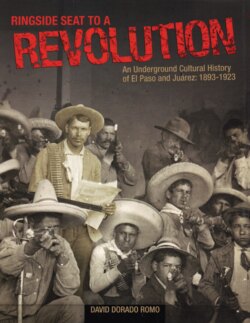Читать книгу Ringside Seat to a Revolution - David Dorado Romo - Страница 42
На сайте Литреса книга снята с продажи.
Оглавлениеthe entire train of people ate breakfast hur-
riedly and put in the rest of the time watch-
ing the revolutionist who seemed indifferent
to the admiration bestowed. The young
ladies seemed to want to hug and kiss the
“brave man,” as they called him, but the for-
midable-looking Rangers with their belts of
cartridges strapped about their waists and
Winchesters in their hands seemed to put a
damper on their feelings.76
In El Paso, Ochoa stood before a federal judge
on the charge of having organized within U.S. soil “a
military expedition for the invasion of Mexico for rev-
olutionary purposes.” Despite a tenacious defense by
his attorney—the future governor of New Mexico,
Octaviano Larrazolo—Ochoa was found guilty. On
April 11, 1895, El Paso’s first Mexican American revo-
lutionist was sentenced to the Kings County Federal
Prison in Brooklyn, New York, for two and a half
years. He was also stripped of his U.S. citizenship.77
IN MARCH 1896, Lauro Aguirre moved the offices
of El Independiente from Arizona to El Paso. It’s not
clear why. Perhaps government surveillance had got-
ten too hot back in Arizona. Maybe El Paso offered a
better strategic location to arm a revolution. Or per-
haps Victor Ochoa’s rebellion had something to do
with it. Aguirre’s fellow journalist, Manuel Flores
Chapa, followed Ochoa’s trial in El Paso closely. He
sat in at the federal courthouse on Oregon Street dur-
ing the proceedings.
There had probably been some kind of commu-
nication between Ochoa’s and Aguirre’s groups after
the massacre of Tomóchic. Both put out very similar
manifestos. Some of the people that fought alongside
Ochoa, such as Benigno Arvizu, later took up arms
during the Teresista Rebellion of 1896 that Aguirre
organized. Even the same paid Mexican informant
that ratted about Victor Ochoa’s underground revolution-
ary activities—Pedro de Lama—would testify at Lauro
Aguirre’s and Manuel Flores Chapas’ trial in El Paso.
Chapa and Aguirre were arrested on March 10,
1896 and brought to El Paso’s federal courthouse to
face charges of neutrality law violations. The Mexican
consul, Francisco Mallén, accused the two journalists
of arming a revolution in Mexico. The only incrimi-
nating evidence brought against them was their Plan
de Tomóchic. But the federal prosecutor brought no
solid evidence linking the manifesto to either of the
accused. Neither of them had signed it.
The defense attorney, W.H. Burges, made a
mockery of the prosecutor’s case. (Burges would later
gain national notoriety for defending the mining town
of Bisbee, Arizona, after it rounded up 1250 anarchists
and IWW union members into a train at gunpoint and
dropped them off in the middle of the New Mexico
desert.) The flamboyant El Paso attorney called Pedro
de Lama—the Mexican government informant who
identified Aguirre and Chapa as the authors of the rev-
olutionary manifesto—“a self-convicted liar and a
moral idiot.”78
Aguirre and Flores were only guilty of having
“predicted a revolution in Mexico in their newspa-
per,” Burges argued.
For weeks the [El Paso] Times was full of
reports of revolution in Mexico…But the
Times was not prosecuted because it had
power behind it. It had the American people
and the American constitution at its back.
But these poor defendants are without
money or influence and they are prosecuted
for publishing what the papers of the United
States are publishing every day.79
Although Aguirre and Chapa were declared not
guilty of all charges, their 16-day stay in jail waiting
for trial forced them to shut down El Independiente
due to lack of funds. A few weeks later, however, it
was up and running again.
For the next several months, Aguirre did exact-
ly what he had just been charged and acquitted of—
he organized military expeditions to overthrow the
government of México.
37
76
Ibid.
77
President Theodore Roosevelt issued a special proclamation that restored it on February 15, 1906.
78
El Paso Times, March 27, 1896.
79
Ibid.
